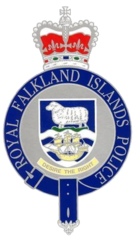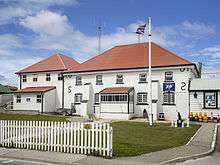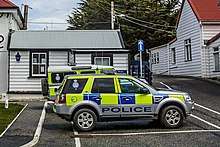Royal Falkland Islands Police
The Royal Falkland Islands Police (RFIP) is the territorial police force responsible for law enforcement within the Falkland Islands. The current Chief Police Officer is Superintendent Jeff McMahon. The Falkland Islands Police Force was granted the "Royal" prefix by HM The Queen on 1 January 1992.[1]
| Royal Falkland Islands Police | |
|---|---|
 | |
| Agency overview | |
| Formed | 1846 |
| Jurisdictional structure | |
| Operations jurisdiction | Falkland Islands |
| Map of Royal Falkland Islands Police's jurisdiction. | |
| Size | 12,173 km2 (4,700 sq mi) |
| Population | 3,150 residents (approx), plus military garrison |
| Operational structure | |
| Headquarters | Stanley |
| Constables | 35 |
| Civilians | 4 |
| Agency executive |
|
| Facilities | |
| Stations | 1 |

History
The force was established on 1 November 1846 with the appointment of Francis Parry as Chief Constable.[1] The Constables Ordinance 1846, which had been enacted by the colony's Legislative Council on 27 October of that year, created an organisation that has remained at the service of the public ever since. It was initially staffed by three officers - the Chief Constable, the Gaoler (responsible for prisoners), and the Night Constable (responsible for policing during the night).[1]
The police station, which has remained the headquarters building since it was completed in 1873, is situated centrally in Stanley. The building, which has had several wooden extensions added over the years, was built of stone by the detachment of Royal Marines that were stationed in the colony at that time.
Today all serving police officers are based at Stanley police station or the military base. Historically local constables were based at Fox Bay (by 1900), and the Jason Islands (by 1920), with another at Grytviken in South Georgia (also by 1920) chiefly to prevent seal poaching.[1]
The police station took a direct hit from a British missile during the Falklands War on 11 June 1982 and was severely damaged. The fabric of the building was repaired but after 135 years of continual service it was totally refurbished in 2008. This was completed in 2009 with the new jail being opened by the Princess Royal on 24 March 2009.[2]
Operation

Communication is based on VHF FM radio and is encrypted. It is monitored from a force control room in Stanley. The use of a repeater greatly extends the range of coverage.
Codes of practice are published originating from the Criminal Justice Ordinance 1989. All equipment issued to officers and practices used comply with Home Office and Association of Chief Police Officers (ACPO) guidelines.
In common with British police practice, officers are not routinely armed. Owing to the small size of the force, there are no permanent armed response units, although some officers are trained and certified as armed response officers.
Personnel
The RFIP has a total staff of 39, including 35 sworn constables (of whom 12 are paid reserves), and 4 civilian support staff for front desk and licensing duties.[3]
Ranks
The force uses the following standard British policing ranks:
The RFIP is headed by a Chief Police Officer, who holds the rank of Superintendent. There is a deputy chief officer with the rank of Inspector.[3]
Uniformed policing
Uniformed community policing is carried out by a team of 14 police constables and 12 reserve constables, supervised by two police sergeants.[3]
Criminal Investigation Department
The island's permanent CID was formed in 2018. Previously criminal detection was undertaken by uniformed police officers. The CID is staffed by four detective constables and one detective sergeant.[3]
Prison service
Until November 2014 the RFIP also provided prison services on the Falkland Islands. Since that time there has been a separate and dedicated prison service, but this is still located within the police station, working with the RFIP to provide custody and detention facilities. The prison service is staffed by a prison manager and four prison guards.[3]
Other Falklands police services
Owing to the large military presence on the Falkland Islands there is always a contingent of Military Police stationed. As a matter of policy, all British Military Police officers assigned to the Falklands are also sworn-in as RFIP reserve constables, so that they have full civil police powers during their tour of duty.[3]
References
- "History". Royal Falkland Islands Police. Retrieved 29 May 2020.
- "Falkland Islands: Weekly Penguin News update". MercoPress. 27 March 2009. Retrieved 28 February 2020.
- "About Us". Royal Falkland Islands Police. Retrieved 29 May 2020.
See also
- Crime in the Falkland Islands
- International Criminal Police Organisation (Interpol)
.svg.png)